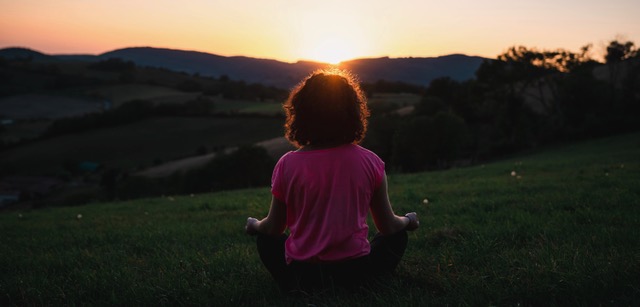Starting a daily meditation practice can feel like a lot at first, intimidating perhaps, or confusing about the hows and whys, but it does not have to be. The benefits of meditation are experienced in varying degrees immediately. Meditating every now and then is great idea and you will perhaps notice small changes with each session you do.
However, a regular daily practice of meditation is the key to cultivating Inner Peace, Focus, Clarity and Connection to our True self and the universal consciousness. Benefits will exponentially increase and physiological and psychological shifts will occur. Your commitment makes the biggest difference in elevating your success.
Please, follow me through my little journey how I ventured into the path of mindfulness and meditation.
Coming from decades of being a massage therapist and practicing other forms of healing arts, exploring buddhism and mindfulness concepts, taking yoga classes and an array of workshops, it was always on my mind that someday I will add meditation to my daily routine of self-care. But, it was a very slow start getting on the road.
When I first started meditating, here and there, whenever I thought I should (a real no-no!) there were a lot of things coming up distracting me from the actual process of meditation. Some of these things I did not hear about, but felt they were what I wanted and needed. ( on a side note: Astrologically having my Moon in Virgo I am a stickler for detail and perfection, so much so, that I never make it to the task on hand. I am working on that!)
1. Creating the spot where I meditated was a lovely task.
I needed a corner that was designated for my sitting time. I felt it needed to be a sacred place. So created a corner in the house, with a small table, got a piece of colorful fabric and placed some meaningful objects on it, sweetly arranged. I had a small buddha sculpture (having started reading buddhist literature and magazines already years earlier) and a few crystals, a flower vase and an insightful book, which changed, depending what inspiration I would work on, or a quote I enjoyed.
It was all about designing my space, but however noble my intention, I was not actually using it.
2. My seat cushion
I had already purchased a round cushion a while back. So I placed it in front of the table, inviting me to sit. I liked the look of it alright! But did I sit a lot, no! From time to time, okay…Part of it was that some meditation cushions are not for everyone. Not until way later when I crafted a cushion square shaped for me, did I sit without feeling my hips hurting, my knees pulling, my back crunching, I was fidgety all the time…It takes time to find your seat! And warm up your spine!
3. Getting myself to sit: I found a gazillion reasons why not to sit today.
- I don’t feel it.
- Does not feel right.
- I am in a strange, sad, restless, anxious or whatever mood.
- I am afraid I will think for the whole time.
- I don’t have enough time.
- My thoughts are racing too much.
- It is too late in the day.
- Too much activity or noise around me.
- I can start tomorrow for sure, just not today.
- Waiting for a sign that I should.
- Simple resistance to sitting.
- I feel fine without it. Who is keeping track?
- you add one 🙂
The list goes on, but is real. If you think about it long enough, of course you won’t sit.
4. The actual sitting: The distractions were numerous.
- Feeling my aches and being restless. Shuffling around and correcting my seat, my hair tickling, my sock being crooked.
- Noises around me, can’t you be quiet?! birds, motors or car doors, sink dripping, people talking, you name it.
- Watching my mind and being upset with me that I just can’t be quiet with my thoughts. The the guilt of not being able to meditate properly.
- Thinking about how much time I have spent sitting. 5 minutes, 7 minutes? Is that enough? Why can’t I sit for longer? Observing my mind wanting to get up and get on with the day.
- It is so distracting to discover your mind wandering off and literally not returning.
It was a struggle at first, real and concrete. But it really all started in the same place that we are supposed to quiet down. The mind! It plays the worst tricks on you, particularly in being hard on the self, discouraging and faulting you to the point you don’t even want to start. Sitting with my mind in the future and the past, not the present.
And, you don’t have to meditate, you choose to do it. When talking to yourself use a positive statement, remind yourself of the choice for sitting and you will more likely do it!



To feel the successes and benefits of meditation it would be good to start practicing kindness, understanding and patience with the self, and allow the busy and unkind mind to take a step back. Look at meditation as a way of giving yourself self-care, self-love and in our busy times a time to truly sit with your best friend, YOU! Feel the calming and softening effect on your being, practice being the observer, removing yourself from the story roaming, allowing the experience of life with listening to your breath, your felt-sense of your body, the magic of presence in that moment. Find the safe space that helps you sit, maybe it is not breath, maybe a color, or an image, a mantra or a word.
- Your physical body needs time to practice sitting still and allowing the back and other body parts to get stronger. The seat becomes easier and easier with time. Gentle movement (5 minutes of yoga) before is of great help.
- How long to sit, or what time of the day, depends on your daily activities and your personality. Start small and increase the amount when you feel ready. Or set a time and try to stick to it. Use a timer to give you a time frame without having to think about it. Any amount of time is a good time. But try to make it to the seat at least once a day. 5-10 minutes is good, 20-30 might allow more time to really settle in and practice. A timer is a nice tool.
- When choosing a place (you could actually be anywhere, couch, car, top of mountain, just remain with a straight back) perhaps investigate when there are the least distractions, comfortable and away from busyness. Have that space be inviting, special and sacred.
- If you encounter distractions, practice just noticing. Gently guide your mind (thoughts and emotions) to your outer peripheral (that is how I visualize it) and observe it, not judging, criticizing, engaging, or running off with it. Experience being without stories and feelings, for moments at a time, even though they will arise again and again. That is the practice! When road blocks kick in (resistence, anxious feelings) you could deepen your breath to let go of the rising tension, and then start over, feel your seat, your safe space, your presence. Just like a new sport or activity you learn, it takes time and practice to acquire the skills. We start small and work our way up.
- Group meditation is a great way to hold you accountable, immerse in the energy of like-minded others. It is said to raise vibrations and many meditators report their greatest sessions in groups.
- There are many different techniques of meditating to explore.

Why daily?
Because that is what it takes to really get in touch with our true selves. We need time to get the other obstacles out of the way so we can start experiencing higher consciousness away from thoughts, feelings and sensations. Also, in reality, most bodies like routines, like eating, sleeping or showering, meditation is a form of keeping yourself clean, fresh, nourished and healthy.
It takes time! You will experience different qualities in your practice from day to day. Observe, maybe journal before going on with your day. Stay kind to yourself, reward your efforts. That was a breaking point for me, not judging the quality or length of my sessions.
Since meditation has become a daily ritual, I find myself having a much better disposition with daily challenges, can feel calmness in the midst of craziness, take a moment before speaking, or just smile instead of reacting. I also find myself moving through the day at a slower pace, yet getting just the same things done, because I am more mindful and my inner focus is stronger. In all, my experiences during the day are more guided by awareness and presence, that is worth the extra effort! And when a day is particularly out of control, I run to the cushion to regroup with my inner Self!
Why a group?
In my personal yoga and meditation practice I have seen many changes, ups and downs, struggles and victories. At yoga studios, workshops and in retreat settings I have engaged in many group meditations, which always leave me charged with lots of positive energy and a lightness of being (breath showers do clean you on the inside!). Exposing myself into a group environment has been a wonderful way to strengthen my body, mind and soul and I have found it always easier to sit when in the company of other meditators.
That is why I am excited to share as much information and wisdom for your own individual path for healing, and encourage you to start your practice, whether on your own or in a group setting for a more peaceful daily self.
https://chopra.com/articles/a-complete-guide-to-raise-your-vibration

HERE IS WHAT TO EXPECT FROM A 4-week Meditation Series:
▪ Learn tools and strategies for a sustainable home practice
▪ Strengthen your existing practice and get a new Jump-start
▪ Discover the multitude of health benefits, explore different techniques
▪ Develop mindful habits for a successful practice
▪ Learn about the mind and breath awareness
▪ Hone your focus, Learn to ride the waves and be present
▪ Experience balance through greater ease in daily activities
▪ Feel calmer and less stressed
▪ Connect with your true self with intention, purpose and surrender
▪ Enjoy positive vibrations and community through group practice
Who benefits from this practice:
- People who always wanted to meditate daily and did not know where to start and how to maintain a practice
- People who need a fresh outlook on an existing practice or return to one
- People who want to feel more balanced, learn to reduce stress or anxious feelings
- People who want to increase their ability to focus and be more effective at work, studying and in relationships
- People of all backgrounds. This course is accessible and understandable to everyone and applicable to any belief system.
Why choose a meditation course in a classroom setting:
- Cultivating a steady practice takes patience and time. A group will help you stay on track.
- Starting or deepen your existing practice with a solid foundation through educational topics, support of the community. A group meditation will create an environment for the success of your personal daily meditation time.
- Meditating with others is invaluable. It has shown to raise positive vibrations sharing a meditation practice in groups

Here are some research reasons for starting a regular meditation practice:(Excerpt compiled by Jonni Pollard)
Physical health benefits of meditation
- Meditation literally grows your brain… both in volume and thickness. This doesn’t just make you smarter; it increases your memory, attention, self-awareness and self-control alongside a whole list of other desirable qualities.
- Meditation increases blood flow to your brain… the brain can’t function without a strong steady flow of blood to it. The stronger and steadier the flow, the better the brain functions.
- Meditation reduces cortisol production, a stress-induced hormone that suppresses the immune system and can make you feel anxious nervous and unsettled for no real reason (other than having too much cortisol in your system).
- Meditation reduces blood pressure and heart rate, which alleviates unnecessary pressure on your heart and arteries.
- Meditation increases neuroplasticity. This is the brains ability to organize itself, adapt to demands and enables you to become more efficient in the learning process.
- Meditation increases the production of good neurotransmitters including serotonin and dopamine, both of which play a huge role in controlling our moods. It’s understood that low levels of serotonin cause depression.
- Meditation triggers the parasympathetic nervous system, which enables us to rest and recover from stress.
- Meditation boosts the immune system. As we reduce our stress, the immune system is boosted and so is our general wellbeing.
- Meditation causes muscle relaxation. Muscle tension is generally caused by stress and when left unchecked can cause all kinds of problems such as vertebrae displacement, spinal issues and lack of mobility in the body.
- Meditation slows the aging process. Meditation significantly increases melatonin and DHEA and decreases cortisol, which has a significant impact on slowing the aging process down.
Psychological benefits of meditation
- Meditation reduces stress related conditions such as anxiety and depression. When we meditate, the brain and nervous system undergo radical changes that cause the reduction and prevention of these conditions.
- Meditation increases stress resilience. When we are able to switch off the sympathetic nervous system (responsible for the fight or flight response) and trigger the parasympathetic nervous system (responsible for the relaxation response) on a regular basis, we are training our bodies to rapidly recover from the impact of stress. Over time the brain learns how to stablise the autonomic nervous system in everyday life without having to switch into the fight or flight response when faced with challenges or demands.
- Meditation increases positive emotions. There are a few reasons why this happens. The simplest reason is the reduction of stress. When we reduce the stress in our system we return to our natural state of feeling calm, connected to ourselves and confident in meeting the challenges of life. When we experience this it feels good and it shows!
- Meditation increases focus and memory. When we meditate, we stimulate the pre-frontal cortex. This is the front part of the brain that is responsible for concentration, focus and problem solving among many other important functions.
- Meditation increases emotional stability and intelligence. When we meditate regularly, and reduce our stress levels, our hormones balance out and we feel less reactive, less defensive and effortlessly balanced more of the time.
- Meditation increases your capacity to learn. By stimulating the pre-frontal cortex, we are also awakening the brains learning centre. More brain volume = more brain power.
- Meditation increases empathy and compassion. These 2 are such games changers in our world and scientific studies reveal that our ability to be compassionate and empathetic is really a brain game. Regular meditation rewires the brain and increases our ability to be able to consider the feelings and needs of others and how we could be of service.
- Meditation increases a sense of connection to your self and others. The more you meditate the more you become aware of who you are. When we allow the mind to go beyond those everyday levels of thinking we may get stuck in and experience deeper more expansive states of ourselves, this experience begins to inform us of our deep subtler nature. After a short while, we experience a more quiet, calmer and dynamic sense of who we are. Our relationships become deeper and more meaningful based on the simple principle, ‘the more you know your self the more you can know another’.
- Meditation increases your sense of purpose and meaning. The more you meditate the more you become aware of what you like and don’t like, what you are passionate about and what you aren’t. Regular meditation gives rise to clarity about what is important in life and a sense of confidence to make choices that enliven your passions and dissolve distractions. Life takes on greater meaning and you feel a deeper sense of purpose and satisfaction.
- Meditation improves sociability. Taking time out for yourself is really important but for us to live a full rich life, we need meaningful connections with others. Nervousness, anxiety and feeling down or disorientated can play a big role in not wanting to hang out with people. Meditation increases our ability to get out there and connect with others as a result of feeling more connected to ourselves and clearer and more confident about what is happening inside us.
Claudia Milius (RYT-200, LMT and Holy Fire® Reiki Master Teacher) is a forever student and teacher of Yoga & Meditation, practices Holistic Bodywork, Energy Healing modalities, and provides Spiritual Guidance.
Her passion is to help people grow and discover their own abilities for healing, peace and clarity. She has a full-time Healing Arts practice, teaches weekly Yoga classes, holds yearly Wisdom Yoga Retreats, as well as monthly Spirit Circles. Creative Reiki Trainings in the Usui tradition are held a few times a year.
www.sacredwellnessarts.com
Here are some websites to look at research supporting benefits of meditation:
www.psycnet.org (MBSR for stress)
www.link.springer.com (depression)
www.journals.lww.com (mood in cancer patients)
www.sciencedirect.com (brain and memory)
www.harvard.health.edu (heart health)
